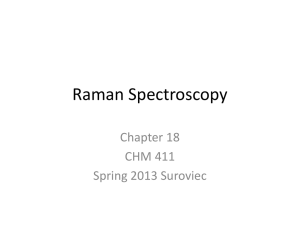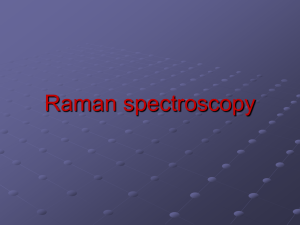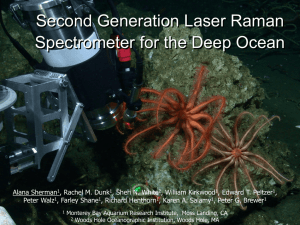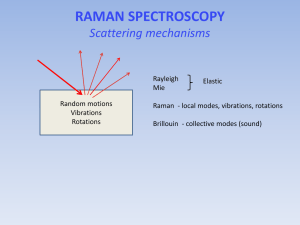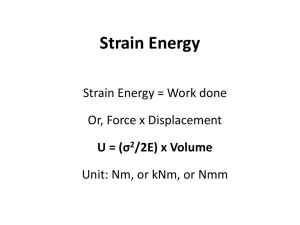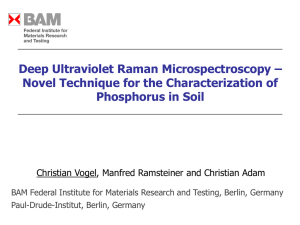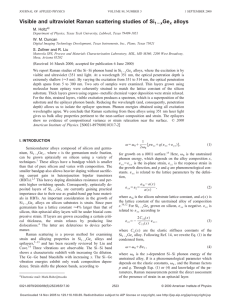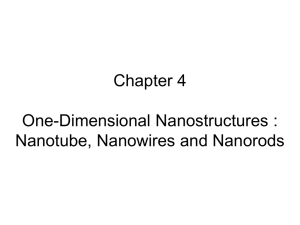José Menéndez
advertisement
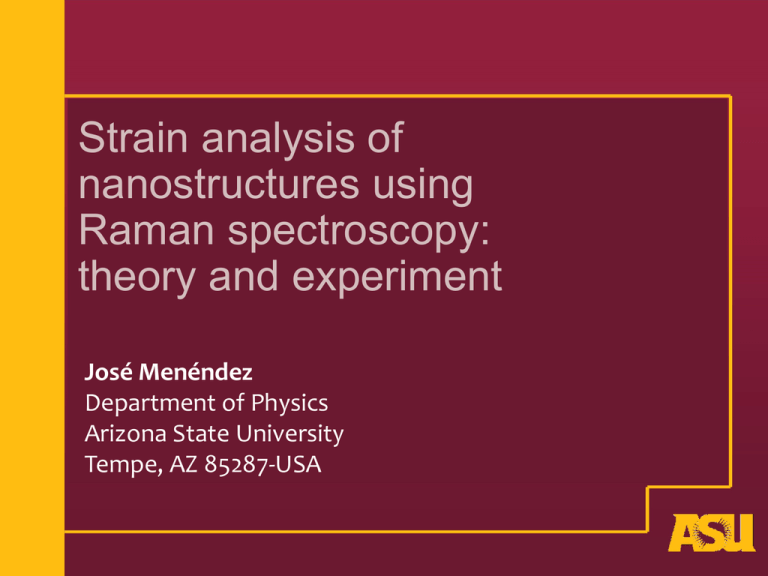
Strain analysis of nanostructures using Raman spectroscopy: theory and experiment José Menéndez Department of Physics Arizona State University Tempe, AZ 85287-USA Just a second... Mexico and us 30,000 Spanish refugees from Spanish War 75,000 Americans moved to Mexico fleeing McCarthysm 50,000 Chileans fleeing dictator Pinochet granted asylum 200,000 Salvadorans fleeing civil war granted Mexican residency 225,000 Guatemalans fleeing counterinsurgency granted refuge Mexicoplatz in Vienna In March of 1938 Mexico was the only country which officially protested at the League of Nations for the violent anexation of Austria to Nazi Germany. In honor of this act the city of Vienna named this park Mexicoplatz. Mexican heroes Advisor: But shouldn’t we make a prior selection of refugees to be admitted into Mexico? Cárdenas: Those who fought in their countries for their legal governments cannot be offended with an interrogation. We must take them all. President Lázaro Cárdenas Mexican heroes II Manuel Azaña, Spain’s last constitutional president, buried with the Mexican flag in France. “For us it represents an honor, for the republicans, hope, and for you [the French government], a painful lesson” Ambassador Luis Ignacio Rodríguez Taboada Quick Time™ a nd a d eco mp res so r ar e n eed ed to s ee this pi ctur e. Dealing with dictators Mexico never recognized Spain’s illegitimate government. It restored diplomatic relations with Spain in 1977, two years after the dictator’s death. Other countries had a different approach: Semiconductor nanowires G. Liang et al., Nano Lett. 7, 642 (2007) •Dense packing J. Drucker •FET performance close to balistic limit •Wrap gates •Core-shell: manipulation of optical and electronic properties via index mismatch, confinement, and strain. Acknowledgements Rachna Singh Eric Dailey Prashant Madras Jeff Drucker “Seedless” nanowire growth • Grown in CVD chamber on < 1ML Au / Si (111) • Si wires (Si2H6) and Ge wires (Ge2H6) •Tunable diameter and density QuickTime™ and a TIFF (Uncompressed) decompressor are needed to see this picture. •<011> nanowire axis direction Eric Dailey and Jeff Drucker, J. App. Phys. 105, 064317 (2009) Core-shell Ge-Si nanowires Ge NWs were grown at 300 °C with 10 mTorr Ge2H6. Si shells were deposited at 540 °C, 3 mTorr Si2H6. Critical thickness I.A. Goldthorpe et al.,Nano Lett. v. 8, 4081 (2008) Strain characterization with Raman spectroscopy •Simple (No synchrotron needed) •Non-destructive (unlike electron microscopy) •Good spatial resolution. Raman scattering phonon (cm-1) 2 kphonon L 2 n 4 n 500 nm 0.5 nm Why is Raman affected by strain? ui K iklm lm u k 2 0 ik klm Tripledegeneracy Anharmonic coefficients. Same symmetry as elastic tensor 3 phonon branches here! Strain lifts the degeneracy... p xx q yy zz 2 0 2r xy 2 strained 2r xy p yy q xx zz 2r xz 2r yz 2r xz 2r yz 0 p zz q xx yy p = K11, q = K12, and r = K44 are anharmonic coefficients . E. Anastassakis, A. Pinczuk, E. Burstein, F. Pollak, and M. Cardona, Sol. St. Comm. 8, 133 (1970). F. Cerdeira, C.J. Buchenauer, F.H. Pollak, and M. Cardona, Phys. Rev. B 5, 580 (1972) Raman selection rules z Phonon displacement Sample y x LightÕ s E-field LightÕ s wave vector x u Eout/in uz Eout/in Eout/in uy Ein/out Ein/out Ein/out Light in Light out Raman tensor 0 0 0 0 0 d 0 d 0 0 0 d 0 0 0 d 0 0 0 d 0 uz uy ux I E R i Escatt i T inc 0 0 0 0 0 d 2 Raman tensors Eigenvecto r of unperturbed phonon j I E R i Escatt i T inc Eigenvecto r of perturbed phonon i L ji u j ui Raman tensor of perturbed phonon i 2 Raman tensor of unperturbed phonon j R i L ji R j j Can we get the strain tensor from Raman measurements? In principle possible. In practice very hard.G. Loechelt et al., APL 66, 3639 (1995), JAP 86, 6164 (1999). In nanostructures virtually impossible due to antenna effects. G. Chen et al Nano Lett. 85, 1341 (2008) QuickTime™ and a TIFF (Uncompressed) decompressor are needed to see this picture. Basic equilibrium equations xx yx zx fx 0 x y z xy x yy y yz zy z fy 0 xz zz f z 0 x y z rr rr 1 r zr fr 0 r r r z r 2 r 1 z f 0 r r r z rz rz 1 z zz fz 0 r r r z Strain in cylindrical coordinates Cartesian 1 ui u j ij 2 x j xi Cylindrical u z zz z u rr r r 1 ur ur r r r 1 ur u u r r r r 1 ur uz 1 uz u rz z 2 z r r z Stress-strain relations in isotropic materials E 1 1 1 2 rr zz rr zz E 1 zz rr 1 1 2 z 1 rz r E 1 rr zz 1 1 2 E 1 E 1 E z rz r The core-shell nanowire Si Ge c a ur r, , z ur r u r, , z 0 uz r, , z uz z Strain in core-shell nanowires ur ur uz rr ; ; zz r r z r 0; zr 0; z 0 r 0; zr 0; z 0 Equilibrium equations rr rr 0 r r 1 0 r zz z 0 d 2ur 1 dur ur 0 2 dr r dr r 2 d uz 0 dz 2 Boundary conditions No net crosssection force Shrink-fit rrcore c rrshell c rrshell a 0 shell zz a 2 c 2 c 0 core 2 zz l u l l urcore c urshell c c misfit uzcore Shrink-fit Same stress at interface shell z misfit No stress @ outer surface Pressing rings around shafts Strain solution-core E core shell E core rr misfit 11 2 a c 2 2 2 2 2 1 1 2 c 1 2 a a c c 2 2 core rrcore core zz a2 c2 misfit 2 2 2 a c c Strain solution-shell E core shell E shell rr shell misfit 1 c2 1 1 2 c2 1 2 a2 a2 c2 misfit 1 2 r 2 2 2 2 a c c misfit 1 c2 1 1 2 c2 1 2 a2 a2 c2 misfit 1 2 r 2 2 2 2 a c c shell zz c 2 misfit r, , z 2 2 a c c2 Core-shell strain Optical phonons with strain Phonons are the solution of the eigenvalue problem: 1,2,3 are the crystal’s cubic cartesian coordinates p11 q 22 33 2r12 2r13 2r12 p 22 q 11 33 2r 23 2 02 2r13 2r 23 0 p 33 q 11 22 <011> oriented nanowires 2 x 2 problem can be easily diagonalized: p q rr q zz 0 0 0 0 2r zz rr 12 p 23 q rr 12 p q zz 2r zz rr 12 p 23 q rr 12 p q zz 0 <111> oriented nanowires 3 x 3 problem can be easily diagonalized: 1 3 p 2q 2 rr zz r zz rr 2 3 r zz rr 2 3 r zz rr 1 3 p 2q 2 rr zz 2 3 r zz rr 2 3 r zz rr 2 0 3 r zz rr 1 3 p 2q 2 rr zz 2 3 Predictions for Ge-Si <011> Predictions for Ge-Si <111> Experiment: <011> nanowires Eric Dailey and Jeff Drucker Raman from pure Ge <011> nanowires • Diameters 10-30 nm. • Twice the Lorentzian linewidth as bulk Ge • 1.2-1.4 cm-1 downshift. Not heating! Raman from <011> Ge-Si core-shell nanowires 11 nm Ge / 5 nm Si 11 nm Ge / 3.4 nm Si 45 nm Ge / 9.1 nm Si 44 nm Ge / 3,7 nm Si Core spectrum interpretation Broader, downshifted peak is Ge-Ge mode from Si-Ge interface. Narrow, upshifted peak is from Ge-core. Since no mode splitting obvious, peak is assigned to LL mode. Theoretical vs. experimental upshifts Sample 44/3.7 Exp. Theo. +2.2 cm-1 +4.37 cm-1 % 49.9 11/3.4 +3.1 +5.13 60.7 45/9.1 +1.8 +7.78 23.5 11/5 +7.7 +11.1 69.6 Critical thickness I.A. Goldthorpe et al.,Nano Lett. v. 8, 4081 (2008) Conclusions core Raman spectrum Predicted shifts VERY sensitive to shell thickness. Observed shifts can be explained with 2 nm roughness/oxide and 40% strain relaxation. Strain level much higher than expected from critical thickness theory. Shell Raman spectrum Theory Conclusions Core -shell Raman spectra predicted and measured. Observed strain larger than expected from equilibrium theory. Good news! Trisilane? Arizona welcomes you (really) Write to us: José Menéndez jose.menendez@asu.edu Jeff Drucker jeff.drucker@asu.edu Fernando Ponce fernando.ponce@asu.edu
